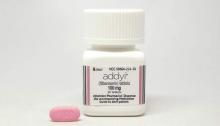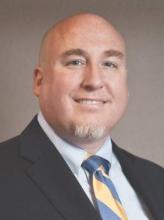Physicians who treat premenopausal women with hypoactive sexual desire disorder now have a Food and Drug Administration–approved option in flibanserin. But the centrally acting daily medication comes with certain conditions: prescribers and dispensing pharmacies are required to complete a certification process, and patients must sign an agreement not to drink alcohol while taking the drug.
How will these restrictions affect real-world practice? The jury’s still out, but some physicians are seeing patients balk at becoming teetotalers to try flibanserin. And while some herald the new drug option to treat women with sexual problems, others remain critical of the drug and the prescriber certification process.
Sprout Pharmaceuticals, which markets flibanserin as Addyi, launched the certification program on Sept. 21. The program involves viewing 13 slides, completing a four-question multiple choice knowledge assessment, and submitting a two-page enrollment form.
Sprout CEO Cindy Whitehead said the company worked closely with the FDA to create a “meaningful” Risk Evaluation and Mitigation Strategy (REMS) program. The program focuses on ensuring physicians understand the safety profile of the drug, she said.
When the FDA approved flibanserin in August 2015, the agency required a REMS program primarily focused around the risk of syncope and hypotension when flibanserin is taken with alcohol. The REMS was required because clinical trials showed that flibanserin has an increased risk for syncope and hypotension with alcohol and moderate or strong CYP3A4 inhibitors, which include proton pump inhibitors, selective serotonin reuptake inhibitors, benzodiazepines, and antifungals.
“So far, the response from health care providers and physicians continues to grow every day,” Ms. Whitehead said. “Thousands of prescribers and pharmacies have completed the certification process which continues to show the need for physicians to have a medical treatment option in their toolkit.”
Dr. Patrick J. Woodman has completed the REMS process for flibanserin but has yet to prescribe the drug. He estimated that the entire certification process took him less than a half hour.
The FDA “is being cautious in general” by instituting the REMS program, said Dr. Woodman, a urogynecologist and clinical professor at Michigan State University in East Lansing. He noted that the clinical trials involving flibanserin use had participants drinking a considerable amount of alcohol over a short time period. “It was interesting to see that the side effects of flibanserin with alcohol are dose related,” he said.
For some women, recognition of the social lubricant effect of a glass of wine may offset their desire to try flibanserin, Dr. Woodman said. The REMS program requires patients to sign an agreement stating that “I understand that I must not drink alcohol while taking Addyi.”
“I haven’t had a lot of women beating down my door about it,” Dr. Woodman said. However, “for a select population of women who have not had success with other approaches, I think this is a good option.”
Dr. Lisa Larkin, an internist and director of the University of Cincinnati Women’s Center, also treats women with sexual problems. She said she’s happy to have an approved drug to add to the discussion of treatment options. Before flibanserin’s approval, the only pharmaceutical options for low female sexual desire involved off-label use, said Dr. Larkin, who is scientific cochair of Even the Score, a coalition that advocates for more options in female sexual dysfunction treatment.
But Dr. Larkin said she’s been very clear with patients that “while we try flibanserin, there is no alcohol.”
Her approach is to advise patients to try flibanserin for a period of 8-12 weeks and then evaluate if the medication is working for them and if the lifestyle trade-off is worthwhile. The notion of complete abstinence from alcohol has been off-putting for patients, even those who are not particularly heavy drinkers, she said. So far, none of her patients have opted to try flibanserin so she has yet to prescribe it.
Another gynecologist puts it this way on social media: “Want to take flibanserin (Addyi) for low sex drive? You can’t drink alcohol. Ever.” On her personal blog, Dr. Jen Gunter, an ob.gyn. and pain medicine physician, also faults the REMS program both for its brevity and a lack of detail.
“The REMS did not mention how to screen, or limiting prescribing for 8 weeks to assess efficacy, or interactions with other drugs,” Dr. Gunter wrote.
Leonore Tiefer, Ph.D., of the department of psychiatry at New York University and a sexologist is also critical of flibanserin’s approval and of the REMS process.




